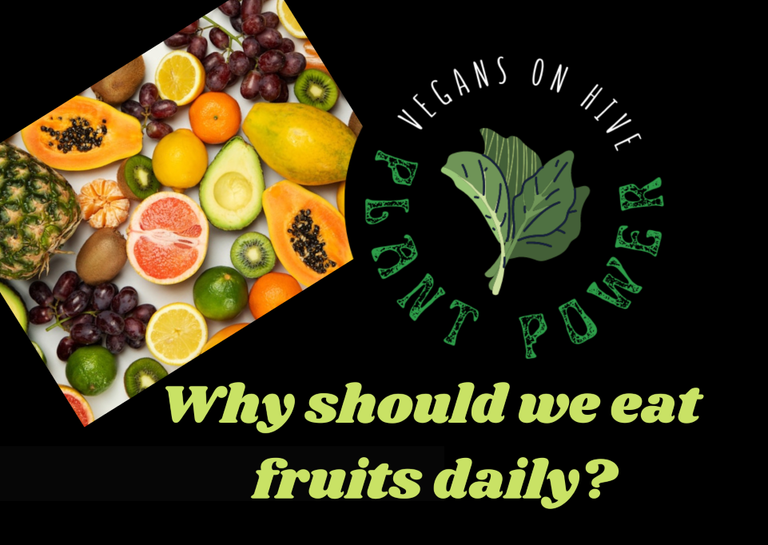
ENGLISH
Hello plant-based foodies, wherever you are in the world and/or galaxy!
Here @sirenahippie

FRUITS are foods that come from plants (plant origin), produced by pollinating flowers. They generally contain seeds. They can be wild or cultivated, and their flavor is generally sweet, although it can also be sour. They require a specific amount of time to grow and ripen, so they have specific harvest times.

On the other hand, depending on the geographic region of the planet, FRUITS are produced seasonally, when the harvest is abundant, they are at their peak consumption point, and they generally drop in price. It is during these periods that it is recommended to purchase and process them for future consumption.

RECOMMENDED AMOUNT OF FRUIT PER DAY (VEGETABLES AND GRAINS ARE NOT INCLUDED IN THIS AMOUNT)
- ADULTS: From 200 to 250 grams daily (minimum).
- CHILDREN: 120 to 200 grams daily (minimum).

HOW TO CONSUME FRUITS?
- Fresh, which is the best option, although some fruits require cooking for their nutrients to be fully bioavailable or even increased. It's recommended to take advantage of the harvest season (remember to wash them thoroughly before eating, and if you're not sure they're organic, remove the skin or peel).
- In preserves, jams, or marmalades.
- Dried or dehydrated.
- In juices.

WHAT ARE THE ADVANTAGES OF EATING FRUIT DAILY?
- They reduce the risk of developing cardiovascular diseases.
- They regulate blood pressure.
- They help reduce bone loss.
- They reduce the risk of developing diabetes, obesity, and other metabolic diseases.
- They provide protection against some types of cancer.
- They support urinary tract health. An example of this is consuming cranberries (fresh, in juice, dehydrated, or in capsules), as they form a coating inside organs such as the bladder and urethra, preventing bacteria and microbes from harboring and developing there. Fruits high in water, such as watermelons and melons, reduce the chance of developing kidney stones.

Based on the above, we invite you to incorporate fruits into your daily diet. We recommend choosing seasonal fruits, which are fresher, more affordable, and easier to acquire. This will be a way to enrich your diet and preserve your health


ESPAÑOL

¡Hola amantes de los alimentos basados en plantas, donde quiera que estén en el mundo y/o la galaxia!
Aquí @sirenahippie

Las FRUTAS son alimentos provenientes de las plantas (origen vegetal), que se producen a partir de la polinización de una flor, por lo que tienen generalmente semillas en su interior. Pueden ser silvestres o cultivadas, y su sabor es generalmente dulce, aunque también puede se ácido. Requieren un determinado lapso de tiempo para crecer y madurarse, por lo que tienen momentos específicos para su cosecha.

Por otra parte, dependiendo de la zona geográfica del planeta, las FRUTAS se producen por temporada, momento en el que abunda la cosecha, están en un punto óptimo de consumo y por lo general bajan de precio. Es en esos períodos de tiempo que se recomienda comprarlas y procesarlas para su futuro consumo.

CANTIDAD DE FRUTAS RECOMENDA AL DÍA (NO SE INCLUYEN LAS VERDURAS NI LOS GRANOS EN ESTA CANTIDAD)
- ADULTOS: De 200 a 250 gramos diarios (mínimo).
- NIÑOS: De 120 a 200 gramos diarios (mínimo).

¿CÓMO CONSUMIR LAS FRUTAS?
- Frescas, que es la mejor forma, aunque hay frutas que requieren cocción para que la biodisponibilidad de sus nutrientes sea efectiva o se incremente. Se recomienda aprovechar las temporadas de cosecha (recuerda lavarlas muy bien antes de comerlas, y si no estás seguro de que sean de origen orgánico, retirar la piel o cáscara).
- En conservas, dulces o mermeladas.
- Secas o deshidratadas.
- En jugos.

¿CUÁLES SON LAS VENTAJAS DE COMER FRUTAS A DIARIO?
- Disminuyen el riesgo de desarrollar enfermedades del sistema cardiovascular.
- Regulan la presión arterial.
- Coadyuvan a reducir la pérdida ósea.
- Reducen el riesgo de desarrollar diabetes y obesidad, y otras enfermedades metabólicas.
- Brindan protección contra algunos tipos de cáncer.
- Ayudan a la salud del sistema urinario. Ejemplo de ello es el consumo de arándanos, (frescos, en jugo, deshidratados, en cápsulas), pues genera una recubierta en el interior de órganos como la vegija y uretra, impidiendo que allí se alojen y se desarrollen bacterias o microbios. Las frutas altas en agua, como las sandías y melones, reducen la posibilidad de desarrollar cálculos renales.

En base a lo anterior, les invitamos a incorporar las frutas como parte de la dieta diaria. Les recomendamos recurrir a las frutas de temporada, que están más frescas, son más económicas y fáciles de adquirir. Esta será una forma de enriquecer tu alimentación y de preservar tu salud

BIBLIOGRAPHY / BIBLIOGRAFÍA

RELATED POSTS / POSTS RELACIONADOS


Delegations welcome!


